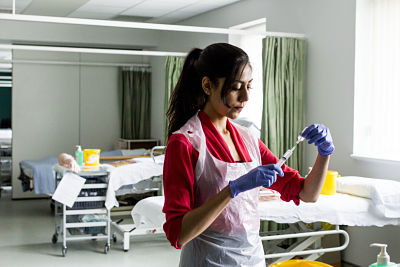Inoculation / Sharps Incidents
This information is applicable in all areas of the University where needlestick/sharps injury or contact with human blood/body fluids is likely.
Advice on action to be taken following any incident which may pose a risk through contact with human blood or other body fluids (including needlestick/sharps injury).
Instant action to be taken in the event of an inoculation / sharps incident
- Wash the site liberally with soap and water (without scrubbing)
- Irrigate mucous membranes/conjunctivae with large quantities of water
- Bleeding must be encouraged for puncture wounds. Do not suck the site.
- Report the incident immediately to your “supervisor”.
- Assess the risk as follows (this may be with the help of your “supervisor”)
The following can be considered LOW risk exposures:
- Exposure of intact skin to any contaminate body fluids.
- Exposure via any route to body fluids other than blood e.g. urine, vomit, saliva and faeces.
- Exposure to body fluids/blood from a source known to be negative for blood borne viruses (HepB, HepC and HIV).
- For HepB virus exposure, regardless of the HepB status of the source, the staff/student is not at risk if they have shown an adequate antibody response following vaccination.
The following can be considered HIGH risk exposures:
- Exposure of body fluids involving percutaneous injury, contact with broken skin or the mucous membranes.
- Exposure to blood/body fluids from a subject known or strongly suspected to be at high risk of being infected with a range of blood-borne viruses.
Action will be necessary based on the results of the risk assessment.
If the “source” patient is available it may be considered appropriate (following a full explanation and with informed consent) to ensure that comprehensive personal details are obtained from the “source” patient and for a blood sample to be taken which should be sent to nearest virology laboratory to be tested for HepB, HepC and HIV with a request for an urgent response.
Reporting Incidents
On weekdays between 9:00am and 4:00pm the supervisor must report all incidents to the Occupational Health Department.
Outside these hours, at weekends or on Bank Holidays contact A&E Department of the nearest hospital if the student is considered to be at high risk of HIV infection.
>ALL INCIDENTS, WHICH OCCUR OUTSIDE WORKING HOURS, MUST BE REPORTED TO THE OCCUPATIONAL HEALTH DEPARTMENT ON THE FOLLOWING WORKING DAY<
Please ensure that all the relevant details regarding the source and student are collected prior to contacting the relevant department.
The vast majority of inoculation injuries are preventable by employing safe working practices and applying universal precautions and prevention should be the mainstay of any inoculation policy. It is an individual’s responsibility to make sure that thier working practices do not put themselves, or others, at unnecessary risk.
Prevention
Avoid inoculation injury by using these simple measures:
- Dispose of the sharp into the bin provided immediately after use.
- Never lay used sharps down on bedside lockers, window sills or work surfaces, or leave lying amongst swabs, paper towels or linen.
- Never re-sheath used needles.
- Pick up all dropped sharps carefully and dispose of them safely.
- Remember! Open – Use – Dispose – Do not let anything interrupt this sequence of events.
- Cover all cuts and breaks in your skin with waterproof dressings or gloves.
- Wash your hands thoroughly after accidental splashing.
- Wear spectacles, goggles or visor when dealing with hazardous materials particularly blood and other body substances which may splash in eyes or mouth.
- If you have a skin problem such as eczema, seek advice from the Occupational Health Department.
- Hands must never be inserted in the sharps bin.
- Close sharps bin and lock securely – never fill beyond the ¾ full.
Support for Students in clinical placement. With regards to health care students going into clinical placement, the attached document details the roles and responsibilities of the Schools within FBMH, the Clinical Placement providers, and Occupation health in protecting, against and responding to any inoculation injuries. http://documents.manchester.ac.uk/display.aspx?DocID=23286
Contractors and visitors should be referred to local Accident and Emergency department and/or GP.

